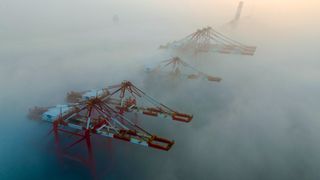The early months of 2025 have thrown up geopolitical upheaval, looming trade wars and intensified strategic competition over advanced technologies like artificial intelligence. In the wake of the Trump administration's reciprocal tariffs plan, and with governments focusing increasingly on “economic security”, Australian businesses face an increasingly complex and volatile global economic environment.
The United States Studies Centre (USSC) is launching a new Economic security dialogue series looking at key policy debates and challenges at the intersection of national security and economics.
The dialogues will be one-day, invitation-only events under Chatham House Rules with participation by senior representatives from government, business, academia, the think tank community and civil society (Track 1.5 model). The USSC is working closely with Australian Government departments on the design of three dialogues in 2025.
- Aligning security and economic interests in the age of AI — 7 May 2025 (Fullerton Hotel, Sydney)
- Tools and rules: The new era of economic statecraft — 29 August (Fullerton Hotel, Sydney)
- Building supply chain resilience in critical minerals: The path ahead — November 2025 (date and venue TBA)
Contact
About the dialogues
Dialogue 1
Aligning security and economic interests in the age of AI
The rapid advance of AI technologies poses complex challenges for policymakers, regulators, and business leaders, impacting national security, economic performance, and social well-being. Governments are developing strategies to harness AI’s benefits while managing its risks through public investments, as well as new governance and regulatory frameworks. Balancing public trust and safety with national security and economic objectives is a key challenge given rapid (and opaque) AI development and its far-reaching implications for society. Events in 2025 have already highlighted the speed at which developments around AI are progressing, including the launch of Chinese firm DeepSeek’s R1 model, the shift in approach under the new Trump Administration and changing priorities at the 2025 Paris AI Action Summit.
The dialogue will be centred on the profound national security, economic and societal implications of rapid developments in AI, with a focus on national capability development, regulation and governance, and international collaboration on shared challenges – informed by the Australian Government’s stated objective to align national security and economic security interests more closely. The dialogue is being convened by the USSC in close cooperation with Australia’s Department of Industry, Science and Resources and with additional support from across the Australian Government, including the Departments of Treasury, Foreign Affairs and Trade, Defence, Home Affairs and the Office of National Intelligence.
Confirmed speakers for this first dialogue include Tarun Chhabra, former Deputy Assistant to the President and Senior Director for Technology and National Security at the US National Security Council, Jade Leung, Chief Technology Officer, UK AI Security Institute, Meghan Quinn PSM, Secretary, Department of Industry, Science & Resources, Australia, Mike Yeh, Vice President and Deputy General Counsel, Director of Corporate, External and Legal Affairs, Asia, Microsoft, and Kazuto Suzuki, Professor at the University of Tokyo and Director of The Institute of Geoeconomics, Japan.
Dialogue 2
Tools and Rules: The new era of economic statecraft
The post-Cold War era of deepening global economic integration has given way to one marked by geopolitical upheaval, resurgent economic nationalism and a diminished role for multilateral institutions like the World Trade Organization (WTO). The use of economic and financial tools (tariffs, industrial policy, sanctions, export controls, etc.) to achieve a wide range of policy objectives has risen sharply over the past decade.
The Trump administration’s aggressive tariff policies are but one manifestation. Others include China’s outsized state subsidies in its quest for market dominance and self-sufficiency in key sectors, the “economic security” strategies of major actors such as the European Union, Japan and South Korea, and the embrace more generally of security-oriented, interventionist instruments of economic policy.
This dialogue will explore the forces driving this new era of economic statecraft, the direction of US-China economic relations, the efficacy of various economic and trade tools, and challenges confronting the multilateral trading system in the face of rising economic nationalism. The dialogue will make a point of injecting business voices into these important debates.
Dialogue 3
Building supply chain resilience in critical minerals: The path ahead
Critical minerals are crucial for national security, economic security and the clean energy transition. China currently dominates the global processing capacity for these minerals, controlling around 90% of rare earths and over half of the processing capacity for cobalt, nickel, and lithium.
Several initiatives have been launched with the aim of increasing the diversity of supply sources. The US-led Minerals Security Partnership (MSP), launched in June 2022 with Australia among its 23 partners, aims to promote responsible growth in the critical minerals sector with high environmental, social and governance standards. To enhance cooperation and co-financing, the MSP Finance Network has been established involving development finance institutions and export credit agencies. At the same time, national initiatives such as the Australian Government’s Future Made in Australia strategy aim to incentivise new private investment in critical minerals production and refining activity.
This dialogue will evaluate efforts domestically and internationally to diversify and strengthen critical minerals supply chains with a view to highlighting key trends and identifying market failures, policy gaps and collective action barriers that remain to be addressed.










